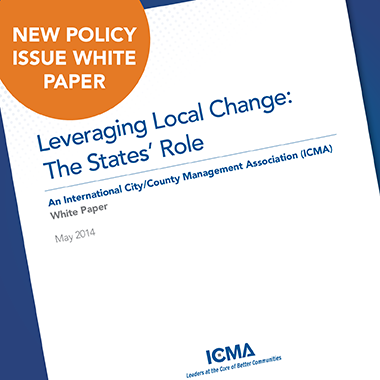
The ICMA Government Affairs and Policy Committee has released its latest White Paper: Leveraging Local Change: The States’ Role. The white paper addresses the assumption that persisting economic hard times require local managers to adopt budget-balancing strategies that go well beyond the typical “business as usual” approaches used in past recessions, which in turn produce fundamental and lasting changes in local services and structures.
Researchers at the University of North Carolina School of Government, through a review of recent studies and case study analyses, examined how cities and counties have responded to severe economic challenges. Several obstacles are identified, especially to shared service consolidation. In a 2011 survey conducted in New Jersey “40 percent [of municipalities who answered] said opposition from citizens was the primary obstacle [to shared service consolidation]; 36 percent indicated that concern over the loss of home rule was a driving barrier, and 34 percent indicated issues related to shared service contracts presented challenges”
States could have an important catalytic role in efforts to realign local structures and services with the realities of economic conditions. For example, in New York, the state has grant money to incentivize collaboration among its municipalities – and often not all the funds are awarded.
With sustained economic pressures on local governments, cities and counties will continue to work with governors and legislators on ways to incentivize inter-local collaboration. Also, governors and legislators will need to support city and county managers and elected officials who seek major structural and service changes, across a range of local political environments.
New, Reduced Membership Dues
A new, reduced dues rate is available for CAOs/ACAOs, along with additional discounts for those in smaller communities, has been implemented. Learn more and be sure to join or renew today!
